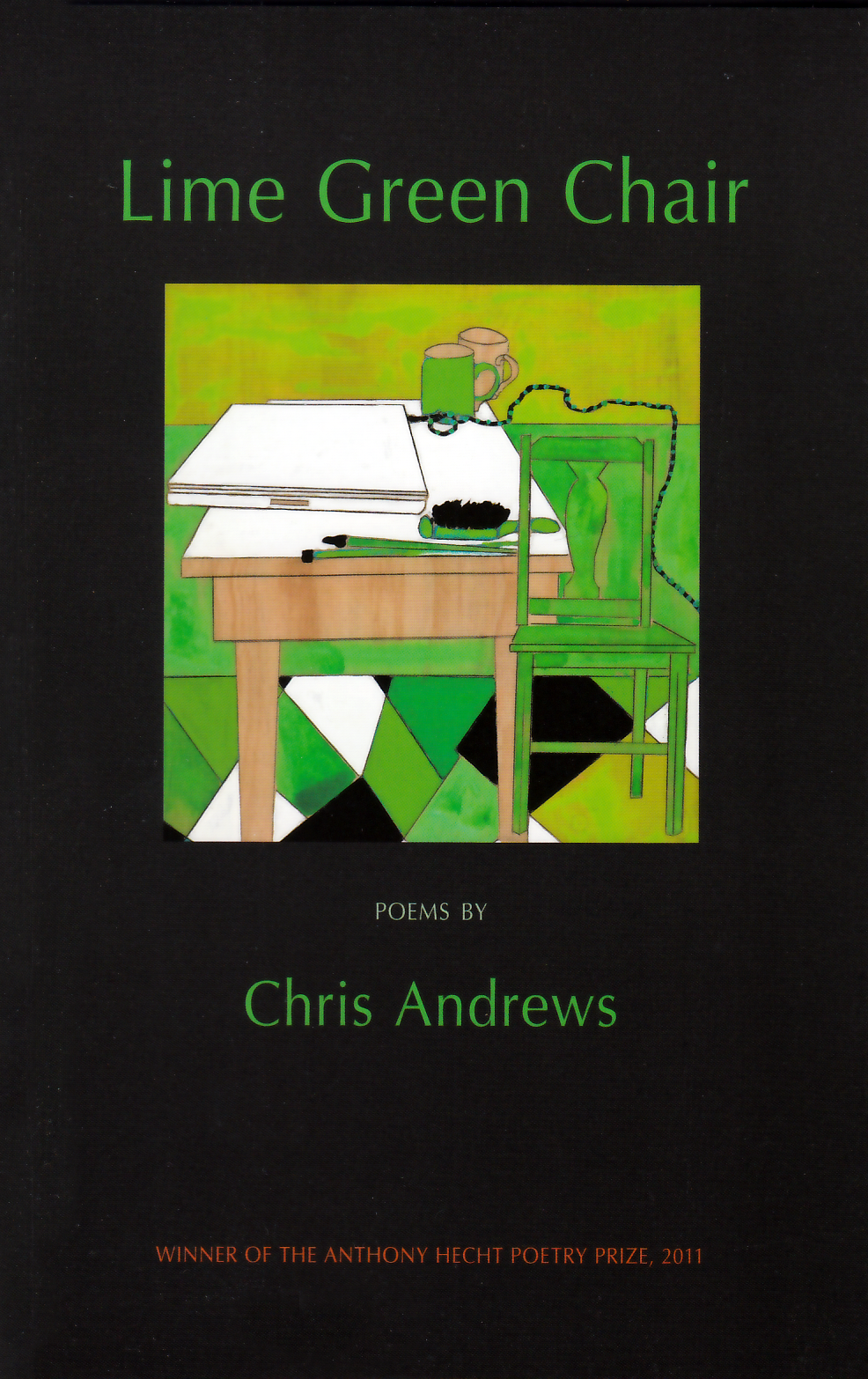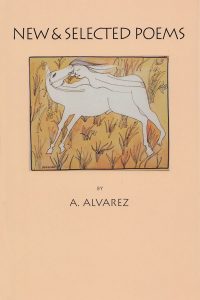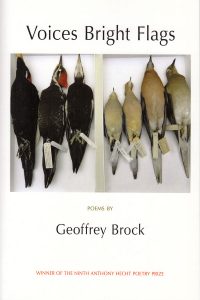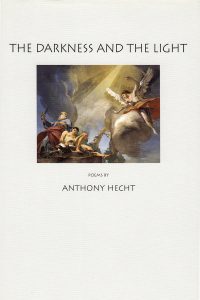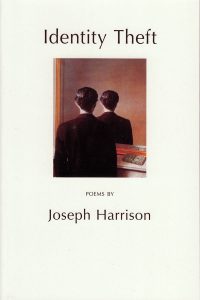Lime Green Chair
£8.99
Winner of the 7th annual Anthony Hecht Poetry Prize
Foreword by the judge, Mark StrandPrompted by episodes from life in urban Australia, or dreamt about, or constructed from curious fragments of language, or, most often, produced in all three ways, the poems of Lime Green Chair (Chris Andrews's second collection and winner of the Anthony Hecht Poetry Prize, 2011) are the work of an entirely distinctive and highly original writer. The poems range in tone from the comic to the elegiac, and in form from the 231-syllable "expanded sonnets" of parts I and III to the "short-story" poems of part II.
Lime Green Chair
“Throughout these poems one senses the ghostly presence of the uncanny, moments of implication, and the discontinuous, troubling character of experience. Precision and strangeness play off one another to great effect … The pressure that time exerts on our selves no matter what, wearing us and our world down, is a constant in Andrews’ poetry. The message is dark, as it tends to be in most lyric poetry, but here, in Chris Andrews’ second book of poems, it is beautifully, memorably articulated.” – from Mark Strand’s foreword
“I read Chris Andrews’s Lime Green Chair with enormous pleasure. It’s a gorgeous, enthralling collection that captures the ‘surrealism of everyday life’, to use a phrase of Elizabeth Bishop’s, with elegance, wit, and supreme sophistication. These supple, eloquent poems coalesce to create a kaleidoscopic elegy to the mournful scandal of time’s passing.” – Mark Ford
“Alert and sparkling, my fellow-poet Chris Andrews has an eye for every small thing in our modern cities: and the words for it. Andrews drinks language with sheer delight, all the way from ‘daft pyjamas’ through ‘plughole’ to ‘guttural haruspication’. His humanism also offers rich intuitions into the dailiness of ageing; his syntax of perception is needle-sharp. Not least, he keeps us diverted with a thirteen-eight stanza form which mockingly subverts centuries of the sonnet in English.” – Chris Wallace-Crabbe
Reviews of Lime Green Chair
Poetry Review, Summer 2013
"Chris Andrews’s second collection … is tightly organised. The middle section contains philosophical vignettes, many of which span several pages. Sections 1 and 3 contain poems of two unrhymed stanzas, the first with thirteen lines and the second with eight – ‘extended sonnets’, if you like. These offer a complex system of fragmented idea and images, a phrase often seeming to suggest the one following by tangential association more than any coherent linear argument, but Andrews exerts more control than that might initially suggest. His world is a multitude of sensations like a film in split screen, ‘mine to assemble in imagination / from parts never meant to compose any whole // yet (‘Continuous Screening’) … Durability and flotsam vie for attention and, if the themes are serious, a sharp wit is also at play. ‘Far Call’ takes place ‘in a place so advanced all the public phones / are falling forever into disrepair’ and in ‘Envoy’ Andrews ushers his own poems into the world while asking ‘how many super-durable monuments / are settling on the windscreens of cars in Rome’ … The bulk of this fine collection contains fresh, invigorating work that will make your head swim with, as MacNeice put it, ‘the drunkenness of things being various’." – Rob A. Mackenzie
The Warwick Review, Vol. VII, No. 1, March 2013
"[A] world of shifting, disturbing disconnections, beautifully controlled by Andrews’s elegant wit, precise diction and formal skill … Lime Green Chair is a hugely ambitious collection, startling in its range and achievement." – William Bedford
Times Literary Supplement, 1.2.13
"The poems in Chris Andrews’s Lime Green Chair … are luminous, artificial interior worlds in which we wander (as in the church of ‘Summits, Hangars’where ‘a smooth cavity of flesh-worn stone /loses the warmth of the day’s last hand’), or from which we are invited to peer out. [T]his, his second collection, was awarded the Anthony Hecht Prize in 2011 and its judge, Mark Strand, provides an introduction … His poems are hightension affairs, very often constructed from … random debris … Any levity is passed over quickly. Play is reserved for language, as in two party poems each beginning ‘You missed the best night …’, the second launching into a virtuoso fugue on current speech patterns: ‘But she goes … and I’m like …’. Relying heavily on a twenty-one-line form, with a ‘volta’after the thirteenth, Andrews achieves memorable effects. ‘Face Work’ traces the way ‘habitual states of mind / are gradually written in muscle and skin’; full of dry wit and clever shifts, its sonnet-like movement reaches a momentary ‘resolution’ at the octave (‘unclamp your lips; unset your jaw; recover / lost adolescent lower-face positions’). In ‘Rooms’ Andrews imagines ‘A hospital room not yet claimed from the sky / somewhere over a weather-swept city scape’, where ‘a last breath will be held / and released’. The form, the ‘show all your workings’ aesthetic, again suits the theme … Chris Andrews’s poems seldom sing, are essentially flightless, but they have an almighty kick and can wake us up to both the unexpected and the obvious:
Sounds that came into the world in my lifetime
already sound old-fangled: dial-up modems,
the implosion of a television tube
in a set dropped from a high window ….
Sunday Telegraph, 27.1.13
"Chris Andrews displays an unusual talent for blending intense observation and supernatural sensitivity in Lime Green Chair … Lonely folk in a vividly depicted Australia hear other voices and other souls. Elsewhere the sense of being haunted is augmented with sly allusions to the work of others." – Mark Sanderson
The fickle insolidity of winter
in a higgledy-piggledy city full
of flimsy timber houses and brick veneer
(and stately Victoriana, to be fair)
as opposed to the monumental seasons
of Europe, solemnly inaugurated,
stretching forth like imperial esplanades,
or tropical humidity forever –
that’s what we talk about over steaming cups
in low-fat sunlight. It has to be better
than perversely looking forward to the day
when life is finally brought to a standstill
by rigorously transparent procedures.
So this is how the mist lifts in a city
that some gifted children consider the pits
while others at the cutting edge of retro
throw a pinch of wishbone ash into the mix;
it lifts like this off a mirror-still river
where, as it is everywhere, cruelty is
unmistakable as a triangle, but
midwinter’s riddled with brilliant days like this.
The Waywiser Press
If I Start
I remember telling my future self, Don’t
start thinking these were the best days of your life
or I’ll disown you. I remember the wind,
still chilly but not unkind, stripping blossom
out of a rain-laden plum tree and bustling
the back end of an apricot storm away
while citrus sidelight put a fugitive glow
into bricks and tiles and gave wet bitumen
sparkling relief. I was going to covet
records, some of which I squirm to remember.
On the cover of one I never owned were
four differently-coloured balloons in a row
resting on a sky-filled mirror of wet sand.
I think I remember that musical spring
of pure possibilities. The problem is,
there’s documentary evidence to prove
that my past self was morosely nostalgic
already: If I forget thee, Wollongong …
Why should I care about being disowned by him?
I don’t. But may I bite my tongue if I start
running down the worthwhile things I haven’t done.
The Waywiser Press
The Mist Liftshttps://surf.pxwave.com/wl/?id=iApWB2QnN9yqdtepvtwo4UAxvCho6zYU&fmode=open&file=.mp3

